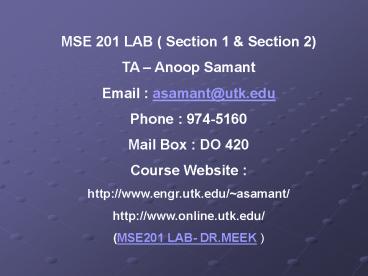MSE 201 LAB Section 1 - PowerPoint PPT Presentation
1 / 25
Title:
MSE 201 LAB Section 1
Description:
Annealed. 870 C for 2 hours. Slow cooled ('Furnace Anneal') What is Measured? Load (Pounds Force) ... Samples: Cold rolled & Annealed 1018. Test #2: Hardness Testing ... – PowerPoint PPT presentation
Number of Views:149
Avg rating:3.0/5.0
Title: MSE 201 LAB Section 1
1
MSE 201 LAB ( Section 1 Section 2) TA Anoop
Samant Email asamant_at_utk.edu Phone
974-5160 Mail Box DO 420 Course Website
http//www.engr.utk.edu/asamant/ http//www.onl
ine.utk.edu/ (MSE201 LAB- DR.MEEK )
2
LAB I
- Mechanical Properties of Steels Tensile,
Hardness, and Impact Testing
3
Test 1 Tensile Testing
4
Introduction
- PLAIN CARBON STEEL
- Designation 1018
- 10 PLAIN CARBON
- (0.02-2.14C, Trace Mn, Si, S, Balance Fe)
- 18 0.18 Carbon
- Good structural strength
- Cheap
- - Poor Corrosion Resistance
5
Sample Conditions
- Cold Rolled
- Annealed
- 870C for 2 hours
- Slow cooled (Furnace Anneal)
6
What is Measured?
- Load (Pounds Force)
- Stress Engineering Stress Conversion
- Displacement
- Crosshead Movement
- Strain from Extensometer
- Adjectives used Strong or Weak material.
7
Tensile Testing
- Measures Load vs. Displacement (Elongation)
- Mechanical properties
- obtained from plot
- UTS
- 0.2 Yield Strength
- Youngs Modulus
- Modulus of Resilience
- Racquetball vs. silly Putty
- Elongation
- Ductility
- Stress at Fracture
- Engineering and True
- Toughness
8
What About Dislocations?
- Necessary to move atoms around
- Ping pong balls in box
- Heat gets rid of them
- Atomic vibrations
- Re-created when strained
- Gives rise to upper and lower yield points
- Similar to static vs. sliding friction
9
Dislocation Example Movie
Pure Metal
Alloy
10
Load vs. Position (Cross Head Motion)
11
Stress vs. Strain (from Extensometer)
12
The Lomer-Cottrell Lock - Annealed Sample
13
RUN TENSILE TESTS!
- Samples Cold rolled Annealed 1018
14
Test 2 Hardness Testing
- Hardness - Resistance to plastic deformation
- Adjectives used - Hard or Soft
- Advantages
- Simple procedure
- Inexpensive to conduct
- Nondestructive (well, sort of)
- tensile strength can be estimated from hardness
15
The Rockwell Scales
- Hardness numbers without unit
- Includes multiple scales
- Different loading levels different indenters
- HRC Hard Steels -gt 150kgf diamond indenter
- HRB Softer Steels -gt 100kgf 1/16 in. Steel
ball indenter - HRF Bronzes -gt 60kgf 1/16 in. Steel ball
indenter - Superficial scales available for thin samples
when needed
16
Conversion of Data to DPH
- Vickers hardness (HV) - DPH (Diamond Pyramid
Hardness) - DPH covers entire range from HRF up to HRC
17
Roundness Correction
Curved cause hardness is read lower than the
actual value. (See ASTM E18 for correction tables)
18
Precautions for Hardness Measurement
- Clean Sample Surface
- Bulk Sample - sample thickness gt 10 times depth
of indent - Indentations shall to be 3 - 5 times the diameter
of the indent apart - Corrections must be made for round surfaces.
(ASTM E-18)
19
Perform Hardness Tests
- Use HRB/HRF Scale
- Load 100/60 kgf
- Indenter 1/16 steel ball indenter
20
Task 3 Charpy Testing
21
Ductile-to-Brittle Transition (DBT)
22
Charpy V-Notch Impact Tests
- Measures Energy Absorbed upon Impact lateral
contraction of the samples - Used Energy Absorbed-Temperature plot to find
DBT temperature - Adjectives used - Tough or Brittle.
- Dull fracture - shear or ductile.
- Shiny fracture - cleavage or brittle.
23
Fracture Surfaces
Cleavage Brittle
Dimple Tough
24
The Set-up
- Procedure - ASTM E23
- Material - Cold Rolled 1018
- Test Temperatures
- Boiling Water (100 ?C)
- Room Temp ( 25 ?C)
- Ice Water (0)
- Dry Ice (-78 C )
- Liquid Nitrogen (-196 ?C)
25
Perform Charpy Tests































